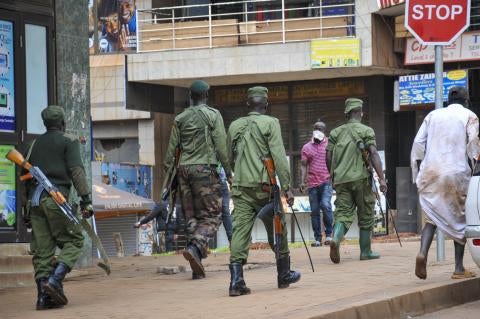Kampala Traders’ Strike Over Museveni Meeting Delay
Last updated: 8 minutes ago
On July 31, 2024, traders in Kampala, Uganda, initiated a strike by closing their shops in protest against various issues affecting their businesses. The strike was prompted by the postponement of a meeting with President Yoweri Museveni, originally scheduled for the same day, to address their grievances. Among the primary concerns are high taxes on imports and the implementation of the Electronic Fiscal Receipt Registration System (EFRIS).
High Taxes and EFRIS Implementation
The traders argue that the high taxes are crippling their businesses, making it difficult to compete with imported goods and sustain profitability. Many traders have voiced their frustrations over the increasing costs of importing goods, which they say have skyrocketed due to the high tax rates imposed by the government. These taxes, they claim, are not only reducing their profit margins but also driving up prices for consumers.
The implementation of EFRIS, a system intended to streamline tax collection and increase compliance, has been met with resistance from the business community. Traders claim the system is cumbersome and increases their operational costs. They argue that the additional administrative burden and costs associated with EFRIS are further squeezing their already tight profit margins.
One trader, Jane Mukasa, expressed her frustration: “We are not against paying taxes, but the way these taxes are being implemented is killing our businesses. EFRIS is supposed to make things easier, but it’s just making our work more complicated and expensive.”
Mixed Reactions from the Business Community
The strike has led to a mixed response across the city. While many shops have remained closed in solidarity, some traders have opted to keep their businesses open, fearing further financial losses. The varying degrees of participation reflect the broader spectrum of opinions within the business community regarding the strike’s effectiveness and the pressing need for dialogue.
John Kato, a shop owner who decided to keep his business open, explained his decision: “I understand why my fellow traders are striking, but I can’t afford to close my shop. My family depends on the income I generate daily, and with the current economic situation, losing even one day’s income can have severe consequences.”
In response to the strike, security forces have been deployed across Kampala to maintain order and monitor the situation. The presence of security personnel has been largely preventive, aiming to ensure that the protests do not escalate into violence. Police have been stationed at key locations in the city, and patrols have been increased to deter any potential disturbances.
A police spokesperson commented, “We respect the traders’ right to protest, but we also have a duty to ensure public safety. Our presence is to prevent any unlawful activities and to protect both the protesters and the general public.”
President Museveni’s postponed meeting with the traders was intended to address these critical issues. The traders are now demanding a rescheduled meeting at the earliest possible date to find amicable solutions to their problems. They have emphasized the importance of government support in fostering a conducive business environment, which is vital for economic stability and growth.
Moses Ochieng, a representative of the traders, stated, “We need the government to listen to our concerns and work with us to find solutions. High taxes and systems like EFRIS are supposed to help the economy, not destroy businesses. We are ready to engage in constructive dialogue, but the government must show that they are willing to listen and act.”
The strike highlights the broader economic challenges facing Uganda, including the need for balanced tax policies and effective implementation of fiscal systems that support both government revenue generation and business sustainability. The traders’ grievances reflect a deeper concern about the overall business climate in the country, which many argue is becoming increasingly hostile to small and medium-sized enterprises.
Economist Dr. Sarah Nsubuga explained, “The situation in Kampala is indicative of larger structural issues within the Ugandan economy. While tax collection is essential for funding public services, it must be balanced in a way that does not stifle business growth. The government needs to consider the cumulative impact of its policies on the business community and work towards creating a more supportive environment.

